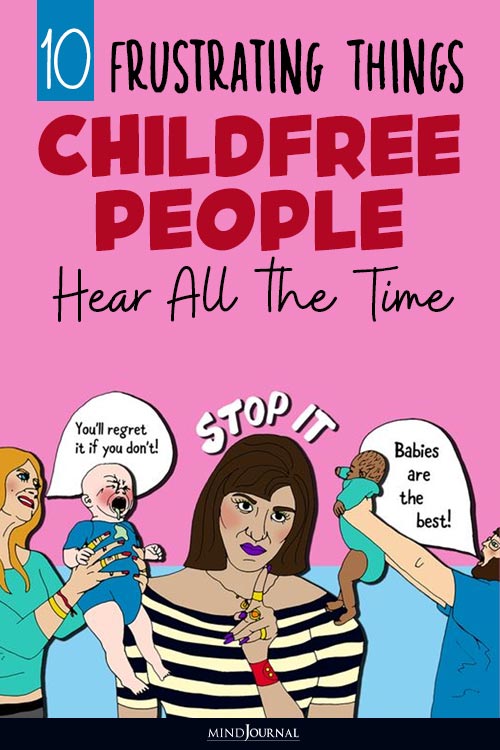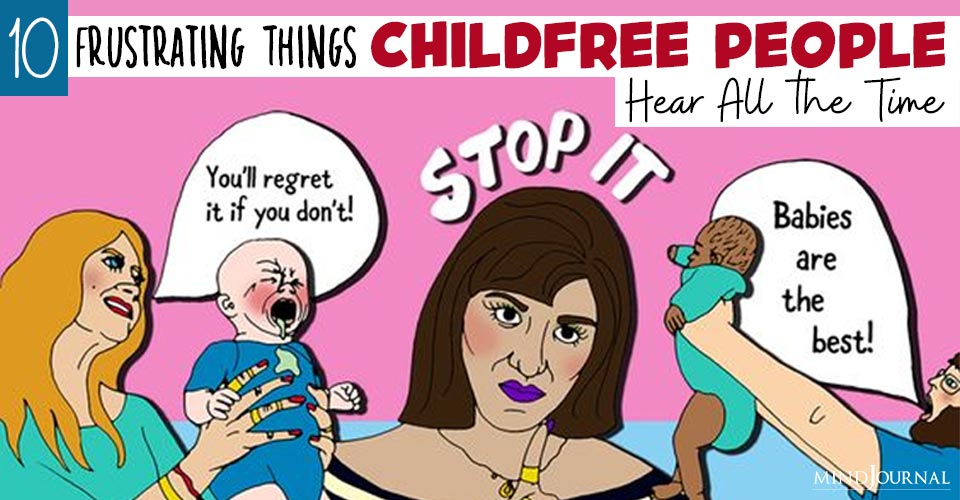Childfree people are often shamed for their choice of not wanting children, be it by their close ones or even strangers. There are so many offensive, insensitive, and frustrating things people say to childfree couples, just because they can’t fathom living a life without having children. Just like for some people, having children is the way to living a happy life, similarly, for some people, a childfree life is the way to go.
Key Points:
- Adults who are childfree by choice often face societal pressures for this decision from those in their social circle.
- Recent generations struggle to overcome gendered expectations surrounding child-bearing.
- While many statements are said with good intentions, they continue to perpetuate a message in our society about expectations.
In 2013, Time Magazine published a spotlight titled “None is Enough: Why Americans are Choosing Not to Have Children.” While almost a decade has passed since its publication, the information contained remains true. There is a continued downward trend in the birth rate, with research finding that the birth rate in the United States birth “has fallen by 20 percent since 2007,” (Kearney et al. 2022). Clearly, more people are choosing to remain childfree.
While research has shown that individuals and couples who choose to remain childfree are comfortable and confident in their decision, (Konnert et all. 2002), it is often others in society that remain uncomfortable.
Here are some of the 10 most common statements frequently heard by people who are childfree by choice, based on my personal and clinical experience.
Related: ‘I Don’t Want Children”: Challenging The Belief That We Should Have Kids
10 Frustrating Things Childfree People Hear All the Time
1. “Oh, I’m Sorry. It Will Happen For You Soon!”
With all due respect, I hope not! Please do not assume that all of us are waiting and hoping to have children.
There are many people who are unable to have biological children for different reasons, and this is often immensely heartbreaking for them.
But plenty of others aren’t trying nor are they upset about not having children. (Those who are trying, I wish you the best in your journey, and this is in no way an attempt to downplay your struggles with this).
2. “I Wouldn’t Feel Like A Woman If I Did Not Have Kids.”
This is highly offensive to all of the women who are unable to have children, and to all of the people who have had children who are not women. Many of us grow up with messages in childhood regarding gender expectations, with females learning early on that they should want children, and that something is wrong with them if they do not.
Children deserve to be born into an environment where they are wanted, cherished, and loved—not simply because it felt like a duty or obligation.
3. “But Babies Are So Cute! Here, Look At This Picture Of My Cousin’s Sister-in-law’s Friend’s Uncle’s Newborn Baby.”
This is when I break out pictures of my four-legged babies. All joking aside, I love children—sometimes. I am so happy for my loved ones who achieve this dream when they want it. I look forward to seeing my little nephews whenever I can, and I live for the precious moments of bonding with young people in my life.
But that does not mean I want to be a full-time parent to an infant. What’s more, many people adopt children who are not babies, and this should be valued and encouraged as much as adopting infants. Yes, babies are cute—but children of other ages need love, too.
Related: Why Women Who Choose Not To Be Mothers Should Be Celebrated
4. “What If Your Husband/Boyfriend/Fiancé Wants Children?”
Then he is welcome to have some. It always amazes me when people assume childfree people haven’t had this conversation with their partner.
It may be safer to assume that childfree individuals have discussed this with their romantic partners if they have them—and it is also not one partner’s duty to provide children for the other partner.
5. “But Don’t You Want To Pass On Your Name/Genes/Etc?”
This statement can be offensive to families who are blended or adopted. Many who do not have biological children hope to someday be able to adopt. Our genes are not more important than all of the children in foster care who do not have homes.
6. “Time Is Running Out. You’re (Insert Completely Arbitrary Socially Constructed Number Here).”
As I hit my mid-30s, I have now officially reached that age where discussions around childbearing are no longer discussed with a hypothetical, future tense. This can be difficult for many reasons. When said to people who struggle with infertility, it is an ever-present reminder of what their body is not able to do for them.
When said to people who are childfree by choice, it implies that they will inevitably have to make a different choice, as the present one is obviously wrong.
7. “Once You’ll Have One, You’ll Love It!”
What in the absolute nonsense does that mean? I would never want to go into parenthood with the idea that I can grow into it.
Related: Starting A Family? Know Your Needs Before You Have Kids
8. “Don’t Tell Me You’re One Of Those Feminist, Career Types.”
With each step forward I make in my career, I still have extended family members who say, “That’s nice, but now it’s time to settle down and have children and stop having fun.” I think I have run out of a response for this one.
Perhaps we need to take a look at why one is valued over the other. Why can’t we do both? Why can’t our careers and other life choices be celebrated on the same level?
9. “But You’d Make Such A Good Parent!”
Then I’ll make a good aunt, uncle, step-parent, friend, or godparent someday, too.
10. “Must Be Nice To Have So Much Free Time.”
In my case, I consistently and consciously made this choice ongoing throughout my adult life. I planned it and made decisions accordingly. I constantly get comments such as “must be nice to be able to travel (or focus on your career, sleep in, etc.)”
But they often fail to consider that I made this decision and the choices I made shaped my own life. I wanted to be able to travel at this stage in my life, so I planned accordingly—when many of my friends were trying to start a family, I was planning my career. One is not worse than the other; they are simply different choices.
In my younger years, these statements used to annoy me. As I enter my mid-30s, I try to remember that most statements are said with a genuine pretense of attempting to be polite. Most people are speaking from their own frame of reference and it isn’t personal, but it took me a while to get here, and I still slip up.
When someone seems genuinely upset that I am not planning to have children, I try to remember that this is something that is important to them, and it does not have to be important to me, and it does not say anything negative about me that we have different values and wants in our life.
Related: Why Mothers With One Child Are Happiest
I am personally grateful to live in a time and place where I am allowed to make these decisions, even if it means dealing with a few shaming but perhaps well-intended comments.
Want to know more about people who don’t want children? Check this video out below why it’s wrong to think that childfree people are selfish!
References:
Jeffries S, Konnert C. Regret and psychological well-being among voluntarily and involuntarily childless women and mothers. Int J Aging Hum Dev. 2002;54(2):89-106. doi: 10.2190/J08N-VBVG-6PXM-0TTN. PMID: 12054274. Sandler L, Witteman K. None is enough. Time Magazine. 2013;182(7):38–46. Kearney, Melissa S., Phillip B. Levine, and Luke Pardue. 2022. "The Puzzle of Falling US Birth Rates since the Great Recession." Journal of Economic Perspectives, 36 (1): 151-76.
Written By Kaytee Gillis, LCSW-BACS Originally Appeared On Psychology Today









Leave a Reply
You must be logged in to post a comment.